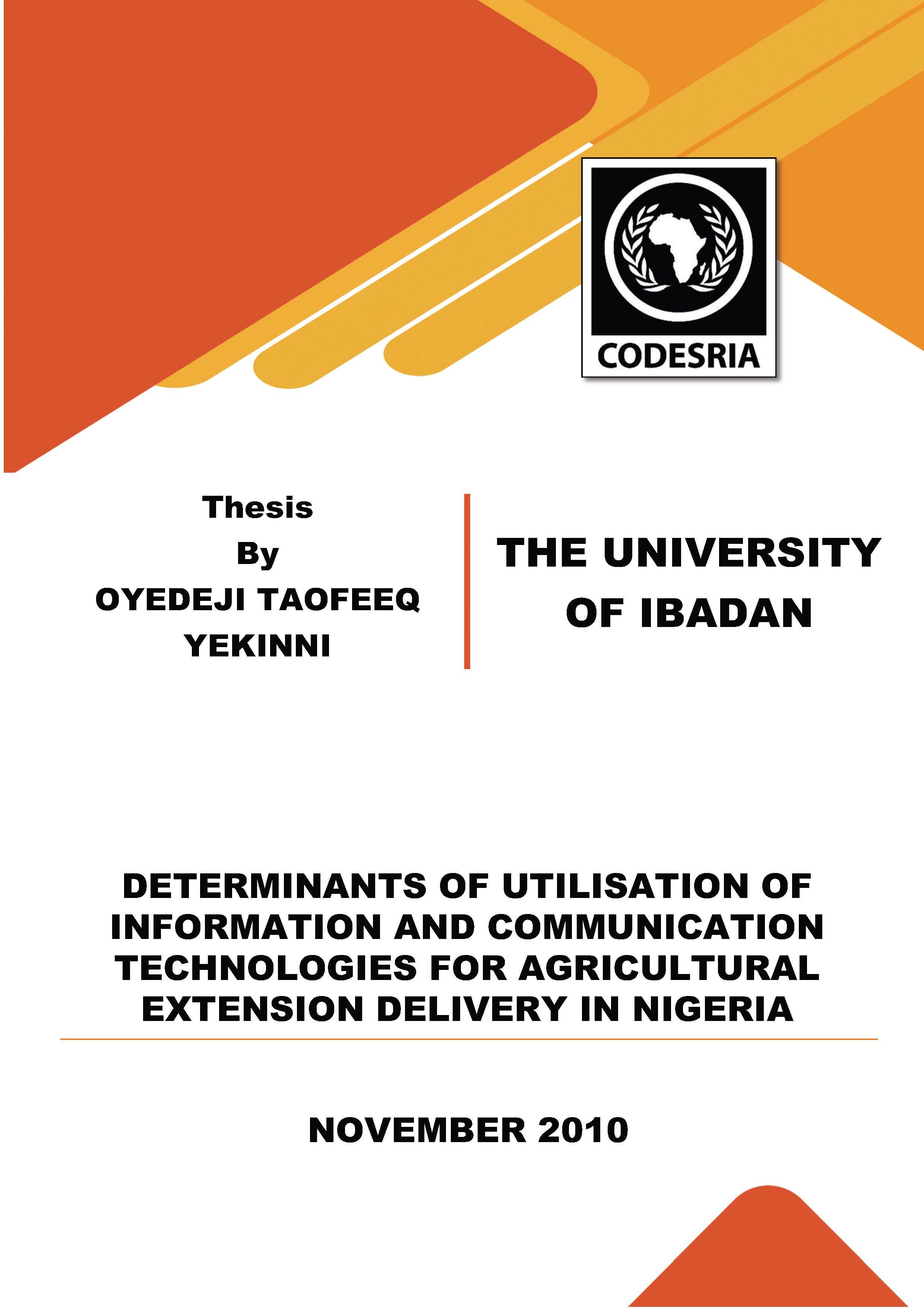DETERMINANTS OF UTILISATION OF INFORMATION AND COMMUNICATION TECHNOLOGIES FOR AGRICULTURAL EXTENSION DELIVERY IN NIGERIA
Mots-clés :
Agricultural information, agricultural extensionists, Information and Communication TechnologySynopsis
Low level of information.sharing within the agricultural knowledge and information system limits growth in the sector. The Information and Communication Technologies (ICTs) has the potential ta bridge the gap. Utilisation of ICTs among agricultural researchers, extensionists and farmers bas ncit been adequately investigated in Nigeria. The extent to which ICTs are used by these stakeholders to advance agricultural practices in Nigeria was investigated.
Multistage random sampling was adopted ta select the respondents. Proportionate random sampling technique was used ta select three, two and two of the research stations in the South-Western, Central and North-Western agricultural zones respectively white the only research stations in each of South-Eastern and North-Eastern zones were selected. Ten percent of the researchers at the selected stations were randomly sampled. Then, 10% of the extensionists in the 6 state ADPs, where
the research stations have been selected were randomly selected. From the ADPs farmers' list in each of the selected states, 35 farmers were randomly selected. Three sets of structured questionnaire were used to elicit information from the different categories of respondents. Data were collected on perception of the use of ICTs, access, availability, level of use and knowledge
ofICTs, farmers' information sources, needs and use of available ICTs and willingness to use digital ICTs. Descriptive statistics, knowledge index and Iogit regression mode] were used ta analyse the data collected. Ail tests were carried out atp = 0.05.
Farmers ranked their information needs in order of importance as agricultural production, product price, marketing, community development, politics, education and weather. Seventy five percent of farmers were willing to use digital ICTs to access information. Mean ICT use score was 33.0±15.8 for researchers, 25.8±15.0 for extensionists and 3.4±1.7 for farmers. Most researchers (75.3%) and few extensionists (34.1%) had high ICT knowledge score. Farmers use the analogue ICT formats (2.33)
than the researchers (1.90) and extensionists (1.93). The log likelihood of researchers' use of ICTs was significantly reduced by g;rade level (P=-0.729), increased by access to ICTs (P=l .807), and increased by perception of sustainable use of ICTs (P=0.303). The log likelihood of extensionists' use was significantly increased by available ICT facilities (P=0.343), access to ICTs (P=l .410), and severity of constraint assessm nt (P=0.182). The log likelihood of farmers' use of ICTs was significantly increased by number of information sources (P=0.267) and marital status (P=1.490).
The disparity in the available information and communication technology formats to agricultural development researchers, extensionists and farmers present a serious challenge to agricultural information management in Nigeria. Multiplicity of information sources predisposed farmers to use Information and Communication Technologies. Availability and accessibility were major determinants of Information and Communication Technologies used by researchers and extensionists.
Téléchargements
Références
Adeya C. N. (2000): Information and communication technologies in Africa: A review and selective annotated bibliography 1990-2000. International Network for the Availability of Scientific Publications (INASP). Oxford, UK, p 12
Aina, L. 0. (1985): "Information Needs and Information Seeking Involvement of Farmers in Six Rural Communities in Nigeria," Quarterly Bulletin of the International Association of Agricultural Librarians and Docurnentalists 30(2): 35-40
Ajayi, G. 0. (2002): Bridging the digital divide: the Nigerian case study. Paper presented at Developing Country Access on Online Scientific Publishing Sustainable Alternatives 4th - 5th October. Accessed at URL http://users.ictp.it/ejds/ seminars2002/Gabrie1_Ajayi/Ajayi.ppt on I October 2002
Akinbile, L. A. (1999): Technology dissemination, agricultural productivity, and poverty reduction in the rural sector of Nigeria. Paper presented at the seminar on poverty and agricultural sector in Nigeria, pp
Alao, C. R. (2004): "Gender analysis of agricultural professionals in Nigerian agricultural institutions". Ph.D thesis submitted to the Department of Agricultural Extension and Rural development, University oflbadan, Nigeria, p I 06, I 09.
Antoine, P. A. (2000): Global economic change and the relevance of information and communication management for stakeholders in rural development, with special reference to the Caribbean region. CTA Annual report 2000. CTA, the Netherlands, pp 16, 23






